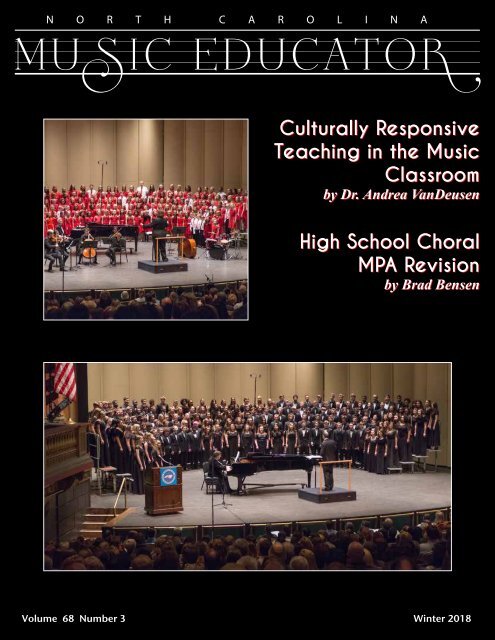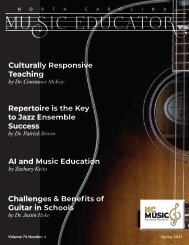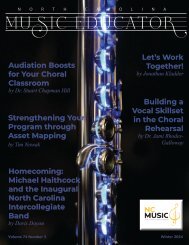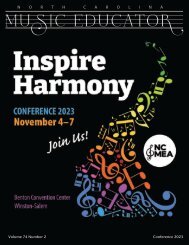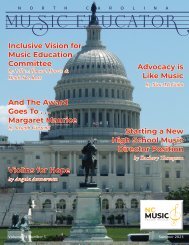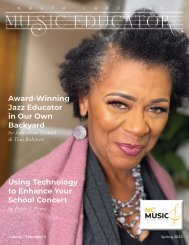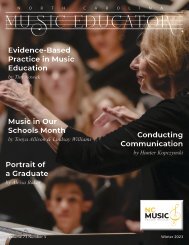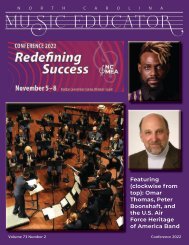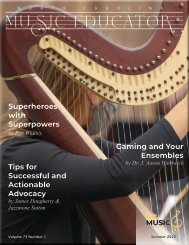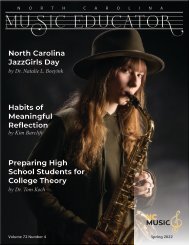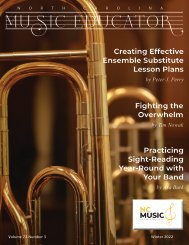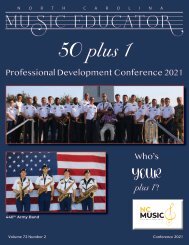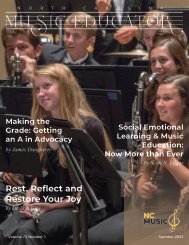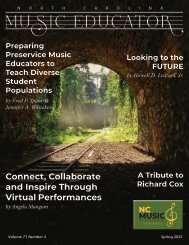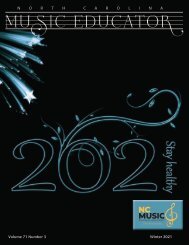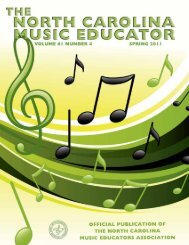NC Music Educator Winter 2018
North Carolina Music Educators Association Journal Winter 2018
North Carolina Music Educators Association Journal Winter 2018
- TAGS
- advocacy
- music-education
- ncmea
You also want an ePaper? Increase the reach of your titles
YUMPU automatically turns print PDFs into web optimized ePapers that Google loves.
N O R T H C A R O L I N A<br />
MUSIC EDUCATOR<br />
Culturally Responsive<br />
Teaching in the <strong>Music</strong><br />
Classroom<br />
by Dr. Andrea VanDeusen<br />
High School Choral<br />
MPA Revision<br />
by Brad Bensen<br />
Volume 68 Number 3 <strong>Winter</strong> <strong>2018</strong><br />
NORTH CAROLINA MUSIC EDUCATOR | 1
2 | NORTH CAROLINA MUSIC EDUCATOR
Board of Directors<br />
EXECUTIVE OFFICERS<br />
President: Jazzmone Sutton*<br />
jsutton@ncmea.net<br />
Immediate Past President:<br />
James Daugherty*<br />
jdaugherty@ncmea.net<br />
President-Elect: Carol Earnhardt*<br />
cearnhardt@ncmea.net<br />
Recording Secretary: Janet Berry*<br />
recording_secretary@ncmea.net<br />
Member-at-Large: Ruth Petersen*<br />
member-at-large1@ncmea.net<br />
Member-at-Large: Johnathan Hamiel*<br />
member-at-large2@ncmea.net<br />
DISTRICT PRESIDENTS<br />
District 1: Leigh Morgan*<br />
district1@ncmea.net<br />
District 2: Joanne McGowan*<br />
district2@ncmea.net<br />
District 3: LaSaundra Booth*<br />
district3@ncmea.net<br />
District 4: Teresa Davis*<br />
district4@ncmea.net<br />
District 5: Roman Brady*<br />
district5@ncmea.net<br />
Band: Rodney Workman*<br />
band_chair@ncmea.net<br />
Band Section Delegate: Jamie Beam*<br />
band_delegate@ncmea.net<br />
Collegiate NAfME: Nicolo Iorio*<br />
collegiate_president@ncmea.net<br />
Elementary: Janet Berry*<br />
elementary_section@ncmea.net<br />
High School Choral: Eddie Adams*<br />
hschoral_chair@ncmea.net<br />
Higher Education: Cynthia Wagoner*<br />
higher_education@ncmea.net<br />
Exceptional Children & General <strong>Music</strong>:<br />
Rue S. Lee-Holmes<br />
exeptionalchildren_generalmusic@ncmea.net<br />
Conference Chair: Barbara Geer<br />
conference_chair@ncmea.net<br />
Asst. Conference Chair: Adam Joiner<br />
conference_assistant@ncmea.net<br />
Mentoring: Windy Fullagar<br />
mentoring_program@ncmea.net<br />
Multi-Cultural Awareness:<br />
Johnathan Hamiel<br />
multi_cultural_awareness@ncmea.net<br />
<strong>Music</strong> In Our Schools Month:<br />
Angela Mangum<br />
miosm_chair@ncmea.net<br />
<strong>Music</strong> Program Leaders: Nathan Street<br />
music_program_leader@ncmea.net<br />
SECTION CHAIRS<br />
Jazz Education: Keith Grush*<br />
jazz_chair@ncmea.net<br />
Jazz Section Delegate:<br />
Marjorie Harrison*<br />
jazz_delegate@ncmea.net<br />
Middle School Choral: Catherine<br />
Butler*<br />
mschoral_chair@ncmea.net<br />
Orchestra: Sarah Russell*<br />
orchestra_chair@ncmea.net<br />
Orchestra Section Delegate:<br />
Joey Walker*<br />
orchestra_delegate@ncmea.net<br />
COMMISSION & COMMITTEE CHAIRS<br />
Research: Jennifer Walter<br />
research_chair@ncmea.net<br />
Retired Membership: David S. Albert<br />
retired_membership@ncmea.net<br />
Student Activities: Carol Earnhardt<br />
cearnhardt@ncmea.net<br />
Teacher Education: Greg Hurley<br />
teacher_education@ncmea.net<br />
Technology Chair: Howard Ledford<br />
technology_chair@ncmea.net<br />
Tri-M: Sarah Lancaster<br />
tri-m@ncmea.net<br />
Webmaster: Mark Healy<br />
mhealy@ncmea.net<br />
Young Professionals: Lisa Qualls<br />
young_professionals@ncmea.net<br />
District 6: Joel King*<br />
district6@ncmea.net<br />
District 7: Andrea Evans*<br />
district7@ncmea.net<br />
District 8: Angela McHenry*<br />
district8@ncmea.net<br />
* Voting Member<br />
AWARDS, GRANTS & SCHOLARSHIP<br />
CHAIRS<br />
Awards: Jonathan Hamiel<br />
member-at-large2@ncmea.net<br />
Mini Grant: James Daugherty<br />
jdaugherty@ncmea.net<br />
Summer Professional Development<br />
Grant: Greg Hurley<br />
teacher_education@ncmea.net<br />
Scholarships: Ruth Petersen<br />
member-at-large1@ncmea.net<br />
STANDING COMMITTEE CHAIRS<br />
Advocacy: Alyssa Montgomery<br />
advocacy_committee@ncmea.net<br />
Constitution: Maribeth Yoder-White<br />
constitution_committee@ncmea.net<br />
Finance: James Daugherty<br />
jdaugherty@ncmea.net<br />
Membership: Carol Earnhardt<br />
cearnhardt@ncmea.net<br />
Publications: Kim Justen<br />
journal_editor@ncmea.net<br />
Collegiate NAfME Advisor: Lisa Runner<br />
collegiate_advisor@ncmea.net<br />
Editor: Kim Justen<br />
journal_editor@ncmea.net<br />
EX-OFFICIO MEMBERS<br />
Executive Director: Pat Hall<br />
pathall@ncmea.net<br />
Historian: Dr. John Henry, Jr.<br />
historian@ncmea.net<br />
<strong>Music</strong> Industry Rep.: Mason Wood<br />
music_industry_rep@ncmea.net<br />
State Department of Public Instruction<br />
Rep.: Jeremy Tucker<br />
jeremy.tucker@dpi.nc.gov<br />
NORTH CAROLINA MUSIC EDUCATOR | 1
N O R T H C A R O L I N A<br />
MUSIC EDUCATOR<br />
<strong>NC</strong>MEA Board Directory<br />
1<br />
A special thank you to all our advertisers who support<br />
music educators and music education in N.C.<br />
<strong>NC</strong>MEA President’s Message<br />
Jazzmone Sutton<br />
<strong>NC</strong>MEA Executive Director’s Message<br />
Pat Hall<br />
4<br />
6<br />
Brevard College<br />
East Carolina University<br />
Hayes School of <strong>Music</strong><br />
Mars Hill University<br />
14<br />
3<br />
11, 22<br />
13<br />
FEATURED ARTICLES<br />
Culturally Responsive Teaching<br />
in the Classroom<br />
Dr. Andrea VanDeusen<br />
High School Choral MPA Revision<br />
Brad Bensen<br />
18<br />
26<br />
Meredith College<br />
<strong>Music</strong> and Arts<br />
The <strong>Music</strong> Center<br />
<strong>NC</strong> Azalea Festival<br />
<strong>NC</strong> School of the Arts<br />
29<br />
Inside Back Cover<br />
19<br />
12<br />
9<br />
Notes from Research<br />
Jennifer S. Walter & Abigail Hart<br />
30<br />
Pfeiffer University<br />
Smoky Mountain <strong>Music</strong> Festival<br />
21<br />
32<br />
COLUMNS<br />
Band Chair’s Message<br />
Elementary Chair’s Update<br />
Middle School Choir Chair’s Message<br />
8<br />
20<br />
22<br />
U<strong>NC</strong> Charlotte<br />
U<strong>NC</strong> Greensboro<br />
U<strong>NC</strong> Wilmington<br />
Yamaha<br />
5, Back Cover<br />
Inside Front Cover, 16, 17, 23<br />
15, 31<br />
7<br />
High School Choir Chair’s Message<br />
Young Professionals’ Celebrates Anniversary<br />
Accolades<br />
Jazz Chair’s Message<br />
Conference Memories<br />
Moved Recently?<br />
Notify NAfME of your change of address.<br />
By doing so, your <strong>NC</strong>MEA membership<br />
address is automatically updated as well!<br />
NAfME: www.nafme.org/login<br />
2 | NORTH CAROLINA MUSIC EDUCATOR<br />
24<br />
24<br />
27<br />
27<br />
28<br />
Editorial: All editorial content should be sent to: Kimberly<br />
Justen, Editor-in-Chief, at journal_editor@ncmea.net.<br />
Advertising: Information requests and ad orders should be<br />
directed to Kimberly Justen, Editor-in-Chief, at journal_editor@ncmea.net.<br />
Advertising deadlines:<br />
Summer/Fall: June 1 (delivery in July)<br />
Conference: August 1 (delivery in October)<br />
<strong>Winter</strong>: December 1 (delivery in January)<br />
Spring: March 1 (delivery in April)<br />
North Carolina <strong>Music</strong> <strong>Educator</strong> is copyrighted. Reproduction<br />
in any form is illegal without the express permission of the<br />
editor.<br />
Postmaster: Send address changes to: <strong>NC</strong> <strong>Music</strong> <strong>Educator</strong>, c/o<br />
<strong>NC</strong>MEA, 883-C Washington Street, Raleigh, <strong>NC</strong> 27605.<br />
Non-Profit 501(c)(3) Organization U.S. Postage Paid at Lubbock,<br />
Texas. ISSN Number 0400-3332 EIN number<br />
20-3325550
East Carolina University® School of <strong>Music</strong><br />
Earn a Master’s Degree in<br />
<strong>Music</strong> Education Online<br />
Established in 2004, East Carolina University’s online MM in music education is North<br />
Carolina’s oldest established comprehensive online music education curriculum.<br />
Master of music distance education classes are taught by the same excellent<br />
East Carolina University School of <strong>Music</strong> faculty that teach campus-based students.<br />
Dr. Michelle Hairston<br />
Chair, <strong>Music</strong> Education<br />
Dr. Gregory Hurley Dr. Jay Juchniewicz Dr. Raychl Smith Dr. Cynthia Wagoner Dr. Andrea VanDeusen<br />
For more information, contact Dr. Rachel Copeland, Coordinator of Graduate Studies,<br />
at skibar@ecu.edu or 252-328-6342, or visit ecu.edu/music.<br />
NORTH CAROLINA MUSIC EDUCATOR C.S. 17-1434 | 3
President’s Message<br />
Jazzmone Sutton<br />
“ Breathe.” I distinctly remember hearing my mom’s voice<br />
calmly guiding my two brothers and me through focused<br />
breathing exercises while growing up. My mom would<br />
have the three of us sit with our eyes closed and reflect on our<br />
interactions with others, focus on something we were looking<br />
forward to or simply practice breathing deeply. This practice gave<br />
us a chance to slow down and be still in what then seemed like a<br />
fast-paced world.<br />
Although at that time, it felt more like a cruel punishment<br />
than a useful practice, I have<br />
grown to find an immense<br />
purpose and power in deep<br />
breathing. As musicians, breath<br />
support takes us through the<br />
most beautiful phrases and<br />
toughest lines. As educators,<br />
we implement breathing in<br />
unison to refocus and center<br />
our students on a common<br />
goal or musical task. Breathing<br />
goes beyond the basic function<br />
of bringing air into our lungs;<br />
it becomes a vital part of<br />
our profession and vocation.<br />
Through focused breathing, we can also reflect on the past,<br />
embrace the present and prepare for the future.<br />
With a focused breath, we are able to reflect on the steps that<br />
were taken up to this point. When reflecting upon <strong>NC</strong>MEA, I<br />
think of the top-notch leadership that has cultivated a strong music<br />
education association for our state. A special thank you to Richard<br />
Holmes for his service to <strong>NC</strong>MEA as he rotates off the <strong>NC</strong>MEA<br />
board from the position of past president. Under his leadership,<br />
<strong>NC</strong>MEA continued to pave the way for quality music education<br />
throughout <strong>NC</strong>. I would like to also extend a note of gratitude to<br />
the district presidents who recently completed their two years of<br />
service at our conference this past November. These members have<br />
given freely of their time, service and hard work to continue the<br />
mission of <strong>NC</strong>MEA.<br />
We experienced a fantastic conference with nearly two<br />
thousand attendees and countless students, and parents. It is always<br />
an inspirational experience to gather with colleagues from around<br />
the state to grow and learn together. Thank you to all of those who<br />
had a hand in providing quality professional development and<br />
musical experiences for teachers, students, and music education<br />
partners from <strong>NC</strong> and beyond.<br />
Also in November, our organization elected new officers<br />
and district presidents. I encourage you to take a moment and<br />
familiarize yourself with the newest board members of <strong>NC</strong>MEA.<br />
These members’ names and contact information can be found<br />
in the <strong>NC</strong>MEA Board section of the About tab on the <strong>NC</strong>MEA<br />
website. Also, on our website, are the new <strong>NC</strong>MEA districts that<br />
have been realigned to match the current <strong>NC</strong> State Board of<br />
Education districts. Newly aligned districts and counties within<br />
them can be found on the<br />
website in the Membership tab.<br />
In the coming months,<br />
music educators around <strong>NC</strong><br />
will be waiting with bated<br />
breath on decisions relating<br />
to the 2017 – <strong>2018</strong> class<br />
size allotments and funding<br />
of program enhancement<br />
teachers, including music<br />
educators. As we enter a<br />
time of uncertainty, trust<br />
that <strong>NC</strong>MEA will continue<br />
to strive with purpose and<br />
great determination to be a<br />
champion for music education. We stand with our fellow music<br />
educators and partners to advocate for a well-rounded education,<br />
which includes music education as enumerated in the Every<br />
Student Succeeds Act, for all of our students. Although <strong>NC</strong>MEA’s<br />
legislative work may not be as prevalent on social media, know<br />
that our organization works diligently behind the scenes every day<br />
to achieve our mission of advancing music education. Please be<br />
sure to read through our monthly e-newsletters for updated and<br />
pertinent information.<br />
Lastly, I want to thank you for your hard work and passion in<br />
providing quality music education to students and communities<br />
around North Carolina. It is through your work that students find<br />
encouragement and inspiration that will last them a lifetime.<br />
– Jazzmone<br />
4 | NORTH CAROLINA MUSIC EDUCATOR
Bachelor of <strong>Music</strong><br />
Choral/General <strong>Music</strong> Education | Composition<br />
Instrumental/General <strong>Music</strong> Education | Instrumental Performance<br />
Jazz Studies | Vocal Performance<br />
Bachelor of Arts in <strong>Music</strong><br />
Option of minoring or double-majoring in another field<br />
music.uncc.edu<br />
NORTH CAROLINA MUSIC EDUCATOR | 5
Notes from the Executive Director<br />
Pat Hall<br />
Welcome New <strong>NC</strong>MEA executive committee<br />
members and district presidents. At the close<br />
of the 2017 <strong>NC</strong>MEA Professional Development<br />
Conference the following new board members took the oath of<br />
office for two-year terms.<br />
President-Elect<br />
Carol Earnhardt, choral director<br />
Robert B. Glenn High School, Winston-Salem<br />
Recording Secretary<br />
Janet Berry, music education specialist<br />
W. A. Young Elementary, Morganton<br />
Member-at-Large<br />
Ruth Petersen, band director<br />
Bailey Middle School, Cornelius<br />
Member-at-Large<br />
Johnathan Hamiel, band director<br />
R.J. Reynolds Magnet High School, Winston-Salem<br />
District 1<br />
Leigh Morgan<br />
Gates County HS & Central Middle School, Gatesville<br />
District 2<br />
Joanne McGowan, E. B. Frink Middle School, LaGrange<br />
District 3<br />
LaSaundra Booth, Zebulon Middle School, Zebulon<br />
District 4<br />
Teresa Davis, Lumberton Senior High School, Lumberton<br />
District 5<br />
Roman Brady, East Forsyth High School, Kernersville<br />
District 7<br />
Andrea Evans, Granite Falls Elementary School, Granite Falls<br />
District 8<br />
Angela McHenry<br />
Bethel Elementary & Riverbend Elementary, Clyde<br />
We have deep gratitude for all members rotating off the<br />
board: past president Richard Holmes, recording secretary Aria<br />
Westbrook, member-at-large Jeffrey Danielson, member-at-large<br />
Andy Carter, and mentoring chair Beth Ulffers. The following<br />
district president’s completed their terms: Jennifer Fowler, Vickie<br />
Whitfield, Jessica Ferguson, Tonya Allison, Lois Parris, Kristen<br />
McGuirk, Lillie Allmond Harris, Brian Barfield, Pamela Collings,<br />
Pauline Reimers, John Phillip Mullinax, Angela Sessoms, Gena<br />
Wiltshire, Hillary Goodson-Spear and Jenifer Hudson. Thank you<br />
for your service!<br />
There are many new opportunities and challenges as we work<br />
together to advance music education in North Carolina. I look<br />
forward to working with the new <strong>NC</strong>MEA board of directors in<br />
this new year.<br />
ADVOCACY UPDATE<br />
We continue to build positive relationships with our legislative<br />
leaders through our lobbyists Ashley Perkinson and Rachel<br />
Beaulieu. They have attended education oversight committee<br />
meetings in the fall and will attend a meeting scheduled for this<br />
month. They are keeping the staff and leadership informed of<br />
any updates on the K-3 class size reductions. In turn we will<br />
update our members through the monthly Enews and Advocacy<br />
Updates. <strong>NC</strong>MEA is holding our position supporting the intent<br />
language included by the General Assembly and urging legislators<br />
to fully fund Program Enhancement Teachers (including music<br />
and the arts) for all local school districts without delay. (Please<br />
refer to the complete position statement on the <strong>NC</strong>MEA website<br />
under the Committees/Advocacy tab.).<br />
District 6<br />
Joel King, Reedy Creek Elementary School, Charlotte<br />
6 | NORTH CAROLINA MUSIC EDUCATOR
Celebrating the 30th anniversary<br />
of Jim Widner Jazz Camps<br />
Artists believe in Yamaha.<br />
“I have been performing on the Yamaha Silent Bass for over 10<br />
years and love everything about it...the sound, the touch, the feel<br />
and the compactness of the bass, which makes it convenient for<br />
travel. It produces the sound of a ‘high end’ acoustic bass but it is<br />
actually more even from top to bottom. I have always treasured<br />
my relationship with Yamaha. The company is totally dedicated to<br />
music education and to their artists.”<br />
- Jim Widner<br />
Leader of the Jim Widner Big Band and<br />
Director of Jazz Studies at the University of Missouri-St. Louis<br />
NORTH CAROLINA MUSIC EDUCATOR | 7
B<br />
and<br />
Rodney Workman, Chair<br />
As we enter the new year, I hope you were rejuvenated<br />
by this year’s professional development conference and<br />
are ready to take on the remainder of the school year. I<br />
think we all owe a huge thanks to the organizers within <strong>NC</strong>MEA,<br />
as well as the clinicians, sponsors, performing groups and vendors<br />
who worked to give us a great conference.<br />
As we enter this last half of the year, MPA is coming up in the<br />
March. There’s a lot of talk these days about the validity of MPA.<br />
However, I’m not sure you can provide another opportunity to<br />
perform for four qualified adjudicators who will give feedback and<br />
honest assessment, find a more organized sight reading assessment,<br />
and perform on a better stage for the minimal fee ranging from<br />
$175 – $225 per band. The process keeps us honest, encourages<br />
high standards of teaching in the classroom, and can give great<br />
feedback and validity to what we are doing, something we need<br />
in this educational climate. Putting our students and ourselves on<br />
stage for others to assess is part of our job as musicians, performers<br />
and educators, and MPA is a great vehicle for assessment.<br />
I’ll be the first to say that a single summative assessment on<br />
a given day in March isn’t in itself inherently educational, but<br />
will give a reminder that you have the power to make any event<br />
educational for yourself and your students. Remember, “the<br />
education is in the process”, and “the process is the product.” I<br />
also value my students being able to hear other performances of<br />
bands in our district in a nice auditorium. To take students to<br />
an event featuring 50-60 other concert bands and not have them<br />
hear groups other than their own is missing a major opportunity<br />
for growth. What kind of message are we sending about the<br />
importance of concert band when we allow our colleagues and our<br />
students to perform to empty concert halls?<br />
Now, it is my great pleasure to recognize leaders and<br />
exceptional teachers in our profession both young and more<br />
seasoned. The purpose of the ASBDA Ed Rooker Encore Awards<br />
is to honor the achievements and service of new band directors<br />
and to promote the ASBDA mission of fostering rising talent in<br />
the music education profession. As you read about the recipients,<br />
it should fill us all with great hope that our profession continues to<br />
be filled with the best and brightest and that we are developing and<br />
mentoring great young teachers within <strong>NC</strong>BA.<br />
The Award of Excellence, is the most prestigious award we<br />
can give North Carolina Bandmasters who are active in the<br />
profession and is a recognition of exceptional teaching, service<br />
and contributions to the profession. Being chosen by your peers<br />
as an excellent teacher has to be one of the highest honors we can<br />
receive. I hope you will take the time to read about all of these<br />
outstanding educators.<br />
Molly Blair<br />
Encore Award, South Central<br />
District<br />
Molly Blair is one of two band directors<br />
at Harris Road Middle School in Concord.<br />
Since graduating from Western Carolina<br />
University in 2012, she has had a successful<br />
teaching career at Southwest Middle School<br />
in Gastonia, Hickory Ridge Middle and High<br />
Schools in Harrisburg, and currently at Harris Road Middle<br />
School in Concord. Blair has been a visual instructor for high<br />
school marching band programs in the greater-Charlotte area,<br />
and joined the inaugural staff for the Lenoir-Rhyne University<br />
“Spirit of LR” in 2016. For the last six years, she has been an active<br />
visual adjudicator. She is also a private flute instructor for grades<br />
six through twelve, and continues to maintain a busy performing<br />
schedule. She is a member of the North Carolina <strong>Music</strong> <strong>Educator</strong>s<br />
Association, the National Association for <strong>Music</strong> Education, the<br />
North Carolina Association of <strong>Educator</strong>s, the National Flute<br />
Association, and is a member of the South Central District Band<br />
Masters Association.<br />
Keith Dublin<br />
Encore Award, Eastern District<br />
Keith Dublin studied music education and jazz studies at East<br />
Carolina University. For the past five years, he has been a band<br />
director in North Carolina. He began his career at Washington<br />
High School, where he taught band and chorus. With a band<br />
program of about 25 students, he took his small but determined<br />
band students to perform for adjudication at a “<strong>Music</strong> in the Parks”<br />
event and received a superior rating. This was the first time these<br />
students ever received a superior rating or had been out of the state<br />
to perform.<br />
In his second year teaching, Dublin became band director of<br />
James B. Hunt Jr., High School. During his time at Hunt High<br />
School the band program received several awards, including being<br />
named grand champion at the Orlandofest competition, multiple<br />
marching band awards and class placements. Additionally, he<br />
was able to revive the jazz band program; in 2016, the Hunt High<br />
School Jazz Ensemble received a superior rating at the North<br />
Carolina <strong>Music</strong> Performance Adjudication for jazz.<br />
Ed Harper<br />
Encore Award, South Central District<br />
Prior to teaching at Concord High, Ed Harper served as the<br />
band director and music theory teacher at South Mecklenburg<br />
High School in Charlotte. In May 2013, he graduated with a<br />
Bachelor’s Degree in music education from U<strong>NC</strong> Charlotte. His<br />
8 | NORTH CAROLINA MUSIC EDUCATOR
Ranked among the best programs in the country,<br />
the U<strong>NC</strong>SA School of <strong>Music</strong> combines highly-personalized<br />
instruction from major studio teachers with numerous<br />
opportunities to perform in ensembles and productions<br />
of all sizes. We’re instrumental to preparing students<br />
for the professional world of music.<br />
It’s purpose.<br />
Not a pipe dream.<br />
uncsa.edu<br />
NORTH CAROLINA MUSIC EDUCATOR | 9
ensembles have received superior ratings at <strong>NC</strong>BA Marching<br />
Band MPA, SCDBA Concert Band MPA and Western Region Jazz<br />
Ensemble MPA events. He is an active member of the musical<br />
community surrounding Concord High. He performs as a member<br />
of the Rowan Big Band All-Stars and the Piedmont Primetime<br />
Community Band in Kannapolis.<br />
Justin McCrary<br />
Encore Award, Northwest District<br />
Justin McCrary is in his seventh year of<br />
teaching, and has been the band director at<br />
South Davie Middle School in Mocksville,<br />
since 2012. A native of Dobson, and a graduate<br />
of Surry Central High School, he received his<br />
Bachelor of <strong>Music</strong> from Appalachian State<br />
University. He completed his student teaching<br />
at Hanes Middle School in Winston-Salem with Dr. Matt Talbert.<br />
Prior to his current position, he served as the band and chorus<br />
director at Thomasville Middle School.<br />
The bands at South Davie have continued to grow and thrive<br />
under McCrary’s direction. Concert and jazz ensembles have<br />
received superior and excellent ratings at the North Carolina<br />
Bandmasters Concert Band and Jazz Band MPA events. 2015<br />
marks the first time in school history that the South Davie eighth<br />
grade band earned a superior in grade III music; and 2016 was the<br />
first time in school history that the jazz band received a superior<br />
rating. He has had numerous students earn placement into the<br />
Davie County All-County Band, Northwest District All-District<br />
Band, and the <strong>NC</strong> All-State Honor’s Band.<br />
Alyssa Montgomery<br />
Encore Award, Central District<br />
Alyssa Montgomery graduated Summa<br />
Cum Laude from Appalachian State University<br />
with bachelor’s degrees in music education<br />
and piano performance. While at Appalachian<br />
State, she was recognized as a Chancellor’s<br />
Scholar, Academic Scholar, Harbinson Family<br />
<strong>Music</strong> Scholar, a member of Pi Kappa Lambda,<br />
and an honors student.<br />
Prior to her appointment at Leesville High School, she was the<br />
Director of Bands at Wendell Middle School where the concert<br />
bands and jazz band performed for many in and out of state<br />
concerts and festivals, receiving multiple superior ratings. There,<br />
she was nominated for the Diane Kent Parker First Year Teacher of<br />
the Year.<br />
In May 2013, she was named the Conductor for the Leesville<br />
Road High School Band Program. She feels it is truly an honor to<br />
conduct the Leesville Band Program where she once performed<br />
as a student. As its conductor and director of bands, she has led<br />
the bands to consistent superior ratings at North Carolina’s <strong>Music</strong><br />
Performance Adjudication. The bands have performed nationwide<br />
including in San Francisco, New York, Chicago, Atlanta, and<br />
Orlando.<br />
Tyler Stark<br />
Encore Award, South Central District<br />
Tyler Stark graduated from Appalachian State University<br />
with a Bachelor of <strong>Music</strong> in instrumental music education and<br />
a certificate of performance in percussion. While at ASU, he<br />
performed in multiple ensembles including the Appalachian<br />
Wind Ensemble, Appalachian Symphony Orchestra, Appalachian<br />
Philharmonic Orchestra, Appalachian Percussion Ensemble,<br />
ASU Steely Pan Steel Band, ASU Afro-Cuban Ensemble, and<br />
the ASU Irish Ensemble. He is a recipient of the ASU Theodore<br />
Presser Scholarship, the B.G. “Bill” McCloud <strong>Music</strong> Scholarship,<br />
and a member of Pi Kappa Lambda. He has had the privilege to<br />
study traditional Celtic music in Ireland at the University College<br />
Cork. He is also a proud alumnus of the Boston Crusaders Drum<br />
and Bugle Corps. He currently teaches at Central Cabarrus<br />
High School where he serves as director of bands. This includes<br />
directing the concert and symphonic bands, the CCHS Marching<br />
Vikings, jazz band, percussion ensemble, and winter guard. He also<br />
continues to perform as a percussionist in the greater Charlotte<br />
area with different groups across different genres.<br />
Kevin Young<br />
Encore Award, Western District<br />
Kevin Young is a graduate of Mars Hill University where<br />
he received his Bachelor’s in <strong>Music</strong> Education and trumpet<br />
performance. He has performed with Johnson City Orchestra, Blue<br />
Ridge Orchestra, and Asheville Jazz Orchestra. He has been a guest<br />
soloist with many of the local middle and high school programs<br />
in Western North Carolina. On top of performing, Young began<br />
his teaching career at Asheville Middle School. During his tenure<br />
there, the band grew to 300 students. Over the last four years his<br />
concert bands and jazz ensembles have received superior ratings<br />
at all MPA events. He has had students selected for county, district<br />
and statewide events in both concert and jazz. He is the new band<br />
director at Enka High School.<br />
Leo Nieves<br />
Encore Award, Eastern District<br />
Leo Nieves received his Bachelor’s in <strong>Music</strong><br />
Education from East Carolina University in<br />
2003. That same year, he took over as director<br />
of bands of Nash Central High School. He<br />
taught for 14 years as the director of bands of<br />
<strong>NC</strong>HS, directing approximately 150 students<br />
in various ensembles, including The Marching<br />
Bulldogs, concert band, wind ensemble, and jazz ensemble A.<br />
Nieves consistently received superior and excellent ratings with<br />
all of his ensembles. His bands have performed in Disney World<br />
twice, Universal Studios three times, and Washington, D.C.<br />
Nieves is currently serving as a principal resident at Winstead<br />
Avenue Elementary School. He is a part of the Northeast<br />
Leadership Academy, one of the top principal preparatory<br />
programs in the country, where he is in his second year of the<br />
program. He will be receiving his Master of School Administration<br />
in May <strong>2018</strong>.<br />
Jane McLaurin<br />
Encore Award, Southeastern<br />
District<br />
Jane Burris McLaurin graduated from<br />
Appalachian State University in 1983 with<br />
a Bachelor of Arts in music education. She<br />
completed her Master of Arts in music<br />
10 | NORTH CAROLINA MUSIC EDUCATOR
APPALACHIAN STATE UNIVERSITY<br />
BOONE, NORTH CAROLINA<br />
<strong>Music</strong> Education · <strong>Music</strong> Industry Studies<br />
<strong>Music</strong> Performance · <strong>Music</strong> Therapy<br />
Sacred <strong>Music</strong> · Theory and Composition<br />
Audition & Scholarship Schedule:<br />
January 20, <strong>2018</strong> (Instrumental and Vocal Areas)*<br />
January 27, <strong>2018</strong> (Instrumental and Vocal Areas)*<br />
February 10, <strong>2018</strong> (Instrumental Areas)<br />
February 24, <strong>2018</strong> (Instrumental and Vocal Areas; for Admission Only)<br />
*To be considered for the Hayes Young Artist Scholarship and Competition, and to participate in the<br />
competition process, prospective students must audtion on one of the starred dates.<br />
music.appstate.edu<br />
828-262-3020<br />
NORTH CAROLINA MUSIC EDUCATOR | 11
community/junior college at Appalachian State University in 1987.<br />
While at Appalachian, she studied flute with Dr. Lynn White and<br />
was a member of the Appalachian State University Wind Ensemble<br />
under the direction of Dr. William Gora and also the ASU<br />
Marching Band under the direction of Joe Phelps.<br />
She taught middle school band for thirty-two years in<br />
Scotland County, at Shaw Middle School, Carver Middle School,<br />
and I. Ellis Johnson Middle School. Her last sixteen years in<br />
Scotland County were at Spring Hill Middle School. Her middle<br />
school bands participated in North Carolina MPA performance<br />
annually, and consistently received excellent and superior ratings<br />
in grade III music. Her students were selected to participate in<br />
the Southeastern District All-District Band each year and she<br />
served as a guest conductor of the Southeastern District All-<br />
District Band in 2003. She is currently in her second year of<br />
teaching music and band at Wallace Elementary/Middle School<br />
in Wallace, SC.<br />
Michael Capps<br />
Encore Award, Central District<br />
J. Michael Capps is the director of bands at<br />
A.L. Stanback Middle School in Hillsborough.<br />
He attended Elon University and earned his<br />
Bachelor of <strong>Music</strong> in music education and<br />
trumpet performance in 1999.<br />
During his tenure at Stanback, the success<br />
of his work has brought more superiors than<br />
years of service. Under his guidance, a continuous flow of A.L.<br />
Stanback band students and private students qualify for All-<br />
District and All-State honor bands in the areas of concert and<br />
jazz. In 2009, the eighth grade band was honored at the Dixie<br />
Classic Festival with Best Brass, Best Percussion, and Best Overall<br />
Band of the day. In 2011, A.L. Stanback was honored at the<br />
U<strong>NC</strong> Jazz Festival as the Most Outstanding Middle School Jazz<br />
Ensemble.<br />
When not at Stanback, Capps is active as an adjudicator,<br />
guest conductor, performer, and private brass instructor. He has<br />
performed with the Triangle Brass Band, Carolina Gold Drum<br />
and Bugle Corps, Greensboro Philharmonia, Cathedral Brass,<br />
March<br />
in the 71 st North Carolina Azalea<br />
Festival Parade located in Historic<br />
Downtown Wilmington, <strong>NC</strong><br />
Elon University Community Orchestra, Church Street Brass,<br />
Alamance Chorale, Timeless, and subs for the O’Kaysions.<br />
Keith James<br />
Encore Award, South Central<br />
District<br />
Keith James earned his Bachelor of <strong>Music</strong><br />
Education from University of South Carolina<br />
in 1983 and his Master’s in Conducting<br />
from Winthrop University in Rock Hill, SC<br />
in 2007. He is a National Board Certified<br />
Teacher in early adolescent and young adult<br />
music. James began his teaching career in 1983 as an assistant<br />
band director at Walterboro High School and band director at<br />
Colleton Middle School. He was the band director at Smithfield-<br />
Selma HS in Smithfield, from 1986-1992; South Granville High<br />
School in Creedmoor, from 1992-1996; Northwest Cabarrus High<br />
School in Concord, from 1996-1998; Independence High School<br />
in Charlotte, from 1998-2007 and is in his eleventh year as the<br />
director of bands at Marvin Ridge HS in Waxhaw.<br />
He has taken his band to many marching and concert events<br />
in which he has received superior and excellent ratings in concert<br />
band in grades 3 – 6, along with many grand championship and<br />
class awards in marching band over his teaching career. He has<br />
served as a clinician for area honor bands, several southeastern<br />
regional honor bands, as well as a marching band clinician<br />
and adjudicator for both concert and marching bands. He is<br />
a member of the Carolinas Wind Symphony, where he is the<br />
section leader and is a freelance tubist in the Charlotte area.<br />
Jason Childers<br />
Encore Award, Northwest District<br />
Jason Childers is currently in his 16th<br />
year at South Caldwell High School serving<br />
as director of bands. He earned his Bachelor<br />
of <strong>Music</strong> Education in 1999, and his Masters<br />
of <strong>Music</strong> Education with a concentration in<br />
instrumental conducting in 2000, both from<br />
Appalachian State University.<br />
Saturday, April 14, <strong>2018</strong><br />
9:30 - 11:30 AM<br />
Free School/Military Marching Band Entry<br />
Travel Reimbursment - contact for details<br />
Over 100,000 Spectators<br />
Televised Event<br />
Register online starting October 2017 at<br />
ncazaleafestival.org<br />
megtadlock@ncazaleafestival.org | 910.794.3103<br />
12 | NORTH CAROLINA MUSIC EDUCATOR
<strong>Music</strong> That Moves Mountains<br />
Contact us to schedule an audition at www.mhu.edu/music<br />
NORTH CAROLINA MUSIC EDUCATOR | 13
His ensembles consistently receive superior ratings and<br />
reviews at adjudicated events, and other performances. His bands<br />
have performed nationally and internationally. His greatest<br />
source of pride has been the number of his high school students<br />
who have continued in the field of music education and become<br />
successful musicians, conductors, and educators in their own<br />
right. Childers is an active clinician, adjudicator, and composer<br />
for concert and marching bands across North Carolina.<br />
Cliff Dodson<br />
Encore Award, Western District<br />
Clif Dodson is the director of bands at<br />
Cane Creek Middle School where he has<br />
taught instrumental music education since<br />
2002. During his career, he has served as a<br />
clinician, adjudicator, and performer. He<br />
conducted the W<strong>NC</strong>BA All District concert<br />
band and has had the honor of conducting<br />
All-County band clinics throughout North<br />
Carolina. He adjudicated for the <strong>NC</strong>BA Concert Band <strong>Music</strong><br />
Performance Adjudication as well other concert band festivals.<br />
He received his Bachelor of <strong>Music</strong> in music education<br />
from Appalachian State University, his Masters of <strong>Music</strong> in<br />
instrumental conducting from the University of Louisville, and<br />
in 2002, became certified by the National Board for Professional<br />
Teaching Standards in early adolescence through young<br />
adulthood/music.<br />
He has taught in both the North Carolina and Kentucky<br />
public schools. His bands have consistently received superior<br />
ratings in both state’s state band and orchestra <strong>Music</strong><br />
Performance Adjudications and have taken top honors in various<br />
national band festivals. The Cane Creek Middle School Honors<br />
Symphonic Band is a four time “Golden Mickey” champion of<br />
Festival Disney in Orlando, has performed on stage at Carnegie<br />
Hall in New York City, and the steps of the Lincoln Memorial.<br />
This Spring they will perform at the World War II monument in<br />
Washington DC.<br />
<strong>NC</strong>MEA Feature Article Rotation Deadlines<br />
Spring: March 1<br />
Technology | Jazz | Higher Education<br />
Summer: June 1<br />
Elementary | Orchestra | Advocacy<br />
Conference: August 1<br />
Items pertaining to conference<br />
<strong>Winter</strong>: December 1<br />
Research | Choral | Band<br />
Feature article submissions should be sent to the<br />
appropriate section chair. Contact information can be found<br />
on the board list in this issue.<br />
See www.ncmea.net for more information.<br />
Pursue Your Passion - Find Your Path<br />
<strong>Music</strong> at Brevard College<br />
• World-class performance<br />
facility, breathtaking scenery,<br />
rigorous training and<br />
collaborative community<br />
• Degrees in <strong>Music</strong> & <strong>Music</strong><br />
Education (K-12 licensure)<br />
• NASM accredited since 1967<br />
Audition dates:<br />
• Monday, January 15, <strong>2018</strong><br />
• Saturday, February 10, <strong>2018</strong><br />
• Saturday, March 17, <strong>2018</strong><br />
(instrumental only)<br />
Generous financial aid packages are available for qualified students.<br />
For more information, contact:<br />
Dr. David Gresham, <strong>Music</strong> Major Coordinator<br />
at musicinfo@brevard.edu or<br />
visit www.brevard.edu/music<br />
14 | NORTH CAROLINA MUSIC EDUCATOR
CELEBRATING 22 YEARS OF SUMMER JAZZ<br />
JULY 15-20, <strong>2018</strong><br />
for middle and high school students<br />
www.uncw.edu/music<br />
910.962.7957<br />
U<strong>NC</strong>W is an EEO/AA Institution.<br />
Accommodations for disabilities may be requested by contacting the Department of <strong>Music</strong> at 910.962.3415<br />
at least 10 days prior to the event.<br />
U<strong>NC</strong> WILMINGTON<br />
DEPARTMENT OF MUSIC<br />
U N C W S U M M E R J A Z Z W O R K S H O P<br />
NORTH CAROLINA MUSIC EDUCATOR | 15
U N C G<br />
SUMMER MUSIC CAMP<br />
America’s Most Popular!<br />
Apply Online & Pay Online!<br />
Beginning February 5, 6 & 7 at www.smcamp.org<br />
All U<strong>NC</strong>G Summer <strong>Music</strong> Camp Applications will be completed<br />
by camp parents ONLINE at www.smcamp.org beginning<br />
February 5, 6 & 7 depending on the program choice. Once<br />
accepted, parents will be able to pay the $50 deposit online<br />
as well. Parents will need to have the name and email address<br />
of the student's primary music teacher in order to complete<br />
the ONLINE application.<br />
Attracting 2,040 students, with a lengthy waiting list, the<br />
U<strong>NC</strong>G Summer <strong>Music</strong> Camp ranks as the largest and most<br />
popular university music camp in the United States. <strong>Music</strong><br />
camp students are under the leadership and guidance of the artist faculty of the U<strong>NC</strong>G<br />
School of <strong>Music</strong>, long recognized as a national leader in musical excellence. In addition,<br />
distinguished music teachers, performers and conductors from the state and nation will<br />
join the staff of the U<strong>NC</strong>G Summer <strong>Music</strong> Camp to ensure that each student receives the<br />
highest quality instruction available. Each summer, more than 170 professional teachers<br />
and musicians are employed as teachers and counselors at the U<strong>NC</strong>G Summer <strong>Music</strong> Camp.<br />
t<br />
t<br />
t<br />
t<br />
t<br />
t<br />
This is America’s largest and most popular university music camp.<br />
In 2017, 2,040 students attended the camp and were taught by a professional staff of<br />
over 170 musicians.<br />
Over the past 35 years, over 60,000 students have attended from nearly every state and<br />
from Canada, England, Belgium, Turkey Germany, Turkey, Taiwan, France, Italy, Spain,<br />
Albania, Rwanda, Russia, Peru, South Korea, Austria, Mexico, India, Japan, & China.<br />
Urge your students to apply early. We accepted 2,040 students into music camp last<br />
year, but hundreds of others had to be turned away. APPLY ONLINE in FEBRUARY!<br />
Complete package including instruction, all meals, air-conditioned dorm room,<br />
recreation and health plan is only $495. Private lesson is optional.<br />
In <strong>2018</strong>, the U<strong>NC</strong>G Summer <strong>Music</strong> Camp will host 15 Concert Bands, 5 Orchestras,<br />
4 Mixed Choruses and 160 Pianists.<br />
Visit our Web Site! www.smcamp.org<br />
Apply online beginning February 5, 6 or 7, <strong>2018</strong>.<br />
U<strong>NC</strong>G Summer <strong>Music</strong> Camp t PO Box 26170 t Greensboro, <strong>NC</strong> t 27402 t 1-800-999-2869<br />
16 | NORTH CAROLINA MUSIC EDUCATOR
SCHEDULE & FEES<br />
Apply Online & Pay Online!<br />
www.smcamp.org<br />
1st Week<br />
July 8 (Sunday) - July 13 (Friday)<br />
Senior High Band Grades 9 through 12<br />
Junior High Band<br />
Beginner Band<br />
Junior Orchestra<br />
Grades 6 through 8 and have<br />
played at least two years<br />
Played one year only<br />
Grades 5 through 9<br />
Grades 6 through 8 and have<br />
played at least two years<br />
Violin, viola, cello, bass<br />
Senior Orchestra Grades 9 through 12<br />
Violin, viola, cello, bass, winds<br />
& percussion<br />
Junior Mixed Chorus Grades 6 through 8<br />
Piano<br />
Grades 6 through 12 and have<br />
played at least two years<br />
2nd Week<br />
July 15 (Sunday) - July 20 (Friday)<br />
Senior High Band Grades 9 through 12<br />
Junior High Band<br />
Beginner Band<br />
Junior Orchestra<br />
Camp Schedule for <strong>2018</strong><br />
Grades 6 through 8 and have<br />
played at least two years<br />
Played one year only<br />
Grades 5 through 9<br />
Grades 6 through 8 and have<br />
played at least two years<br />
Violin, viola, cello, bass<br />
Senior Orchestra Grades 9 through 12<br />
Violin, viola, cello, bass, winds<br />
& percussion<br />
Fees<br />
Plan 1 - Complete Package $495<br />
6 days, 5 nights, 16 meals, air conditioned dormitory room,<br />
instruction, health care, and recreation.<br />
or $515 with a half-hour private lesson included<br />
or $535 with a one-hour private lesson included<br />
Plan 2 - Day Camp plus Meals $405<br />
for Local Residents<br />
Includes instruction, 16 meals, health care and recreation.<br />
Reporting time 8:30 a.m. (earlier if you wish to have<br />
breakfast) until 9:15 p.m.<br />
or $425 with a half-hour private lesson included<br />
or $445 with a one-hour private lesson included<br />
PIANO CAMP includes one hour of private lessons.<br />
Plan 1 = $535 Plan 2 = $445<br />
Applications & Payment of Fees<br />
Now Online!<br />
This year, all U<strong>NC</strong>G Summer <strong>Music</strong> Camp Applications<br />
will be completed by music camp parents ONLINE at<br />
www.smcamp.org beginning February 5, 6 & 7. Once<br />
accepted, parents will be able to pay the $50 deposit<br />
online as well. Parents will need to have the name and<br />
email address of the student's primary music teacher in<br />
order to complete the ONLINE application.<br />
Senior Mixed Chorus Grades 9 through 12<br />
Piano<br />
Grades 6 through 12 and have<br />
played at least two years<br />
Grade is determined by the current (2017-18) school year.<br />
U<strong>NC</strong>G Summer <strong>Music</strong> Camp t PO Box 26170 t Greensboro, <strong>NC</strong> t 27402 t 1-800-999-2869<br />
NORTH CAROLINA MUSIC EDUCATOR | 17
Culturally Responsive<br />
Teaching in the <strong>Music</strong><br />
Classroom<br />
by Dr. Andrea VanDeusen<br />
Culturally responsive teaching is a phrase educators use<br />
more and more when discussing teaching practice. What<br />
is culturally responsive teaching, and how might music<br />
educators incorporate it in their practice?<br />
To understand culturally responsive teaching, one must first<br />
understand the meaning of culture. The term culture refers to the<br />
values, beliefs, behavioral and interactional norms, and worldviews<br />
shared by members of a group. 1 Cultural knowledge shapes the way<br />
people perceive the world around them and the people with whom<br />
they interact.<br />
In educational settings, culture influences interactional styles<br />
between teachers and students, and influences the perceptions<br />
of both teachers and students in these interactions. Cultural<br />
differences can negatively impact teaching and learning if<br />
teachers are not aware of culture’s influence in their classroom<br />
environments. Scholars of culture and education suggested that<br />
in order to connect with students whose cultural backgrounds<br />
differed from their own, teachers must recognize that students’<br />
lived experiences are valuable in the teaching and learning process,<br />
and teachers must acknowledge and incorporate their students’<br />
cultural identities in their classrooms.<br />
Gloria Ladson-Billings coined this approach as culturally<br />
responsive pedagogy. 2 Culturally responsive pedagogy is “a<br />
pedagogy that empowers students intellectually, socially,<br />
emotionally, and politically by using cultural referents to impart<br />
knowledge, skill, and attitudes”. 3 Culturally responsive pedagogy<br />
includes three criteria:<br />
1) students must experience academic success;<br />
2) students must develop and/or maintain cultural competence;<br />
3) students must develop a critical consciousness through which<br />
they challenge the status quo of the current social order. 4<br />
Culturally responsive teachers incorporate students’<br />
backgrounds, knowledge, and experiences into their teaching.<br />
They promote learning from a variety of perspectives and facilitate<br />
a collaborative learning environment in which students and<br />
teachers are able to share their expertise. Culturally responsive<br />
teachers build relationships with their students outside of the<br />
classroom environment and seek to connect students’ learning in<br />
their classrooms with the inherent knowledge found in students’<br />
communities.<br />
Many resources exist in music education literature on culturally<br />
responsive teaching, as well as multicultural education. 5 The<br />
following are a few considerations for music teachers seeking to<br />
teach using culturally responsive pedagogy in their own contexts:<br />
Culturally responsive teachers seek to build a community<br />
of teaching and learning. They take time to value their students’<br />
identities and knowledge by asking:<br />
• Who are my students?<br />
• What knowledge and expertise from their homes and<br />
communities do they bring with them to the music classroom?<br />
• What musical knowledge do my students already possess<br />
from their homes and communities?<br />
Culturally responsive teachers show they value students’<br />
identities, knowledge, and experiences by:<br />
• Creating a classroom environment reflecting the students<br />
who inhabit it, asking, “What cultures are represented on my<br />
bulletin boards and in posters on my walls? What cultures are<br />
not?”<br />
• Considering curricular choices such as: “Who is/is not<br />
represented by the composers of the repertoire I choose? By the<br />
genres and styles? Do my selections reflect my own values? If so,<br />
how might this impact my connection with my students?”<br />
• Sharing in teaching and learning by involving students in<br />
musical decision-making, and facilitating discussions about the<br />
historical, social, and political context(s) of music students study.<br />
Then, they connect those discussions to students’ lived experiences.<br />
18 | NORTH CAROLINA MUSIC EDUCATOR
Culturally responsive teachers take time to reflect upon<br />
their own cultural identities. Just as students’ cultural identities<br />
influence the ways in which they interact with the world, teachers’<br />
cultural identities impact their interactions with students as well.<br />
Culturally responsive teachers ask themselves:<br />
• What is my cultural lens?<br />
• What experiences do I bring to the classroom?<br />
• What values and biases do I carry?<br />
• How do my values and biases shape the way I interact with<br />
students?<br />
• How do my values and biases shape the way I teach?<br />
Sometimes people ask, “Isn’t culturally responsive teaching just<br />
good teaching?” 6 In many ways, it is. Culturally responsive teaching<br />
requires teachers to get to know and build relationships with<br />
students and the community. Culturally responsive teachers honor<br />
students’ knowledge and lived experiences, and help students<br />
understand music within its cultural, social, and political contexts.<br />
Culturally responsive teaching helps teachers create a community<br />
where students are valued and challenged, something we all seek<br />
as humans. It also requires teachers to examine their own cultural<br />
lenses and reflect critically on the teaching and learning they<br />
facilitate in their classrooms. This article merely skims the surface<br />
of culturally responsive teaching, but I hope these ideas might help<br />
you to consider ways in which you already are, and might continue<br />
to progress toward, culturally responsive teaching in your own<br />
music classrooms and communities.<br />
Endnotes<br />
1<br />
Culture. (2017). Merriam-Webster. Retrieved from http://www.<br />
merriam-webster.com/dictionary/culture.<br />
2<br />
Gloria Ladson-Billings, “But That’s Just Good Teaching! The<br />
Case for Culturally Relevant Pedagogy,” Theory into Practice 34, no.<br />
3 (1995b): 159-165.<br />
3<br />
Ladson-Billings, The Dreamkeepers: Successful Teaching for African-American<br />
Students (2 nd Ed.) (San Francisco, CA: Jossey-Boss,<br />
2009), 20.<br />
4<br />
Ladson-Billings, “But That’s…”, 160.<br />
5<br />
Carlos Abril, “<strong>Music</strong> that Represents Culture: Selecting <strong>Music</strong><br />
with Integrity,” <strong>Music</strong> <strong>Educator</strong>s Journal, 93, no. 1 (2006), 38-45;<br />
Vanessa Bond, “Culturally Responsive Teaching in the Choral<br />
Classroom,” Choral Journal, 55, no. 2 (2014), 8-15; Kate Fitzpatrick,<br />
“Cultural Diversity and the Formation of Identity: Our Role<br />
as <strong>Music</strong> Teachers,” <strong>Music</strong> <strong>Educator</strong>s Journal, 98, no. 4 (2012), 53-<br />
59; Vicki Lind & Connie McKoy, Culturally Responsive Teaching in<br />
<strong>Music</strong> Education: From Understanding to Application, (New York, NY:<br />
Routledge, 2016); Julia Shaw, “The Skin That We Sing: Culturally<br />
Responsive Choral <strong>Music</strong> Education,” <strong>Music</strong> <strong>Educator</strong>s Journal, 98,<br />
no. 4 (2012), 75-81.<br />
6<br />
Vicki Lind & Connie McKoy, Culturally Responsive Teaching…”,<br />
141-42.<br />
PLEASE ALLOW US TO INTRODUCE an old friend and<br />
colleague in a new role! RICK DILLING has worn a lot of hats on The <strong>Music</strong> Center<br />
team over the years...most recently as manager of our Asheville location. We are<br />
pleased to announce that Rick is throwing another hat into The <strong>Music</strong> Center<br />
ring as an Educational Representative!<br />
The <strong>Music</strong> Center is built on a foundation of service, quality instruments and<br />
accessories, highly skilled, in-house maintenance and repairs, vast music selection,<br />
private music instruction and school band support. Serving western <strong>NC</strong> for almost<br />
50 years, we are still committed to be your full service MUSIC CENTER!<br />
RICK DILLING<br />
Educational Representative<br />
NORTH CAROLINA MUSIC EDUCATOR | 19
Elementary<br />
Janet Berry, Chair<br />
It is my privilege to be your Elementary section chair, and<br />
as I have stated, my major goal is to strengthen and build<br />
our connections with each other. Your input of ideas,<br />
questions or concerns are invaluable. Please feel free to email me<br />
at elementary_section@ncmea.net with your thoughts so that<br />
together we make the Elementary section of <strong>NC</strong>MEA the best it<br />
can be.<br />
Wow, what a Professional Development Conference this year!<br />
We had amazing sessions with John Feierabend, Cheryl<br />
Lavender, Graham Hepburn (Mr. Quaver), Cherie P. Herring,<br />
Elizabeth McFarland, David Row, Dr. Manju Durairaj, Leda<br />
Scearce, Rachel Grimsby, Tonya Allison, Dee Yoder, Kellee Church,<br />
Richard Sigler, Felicia Davis, Eric Johnson, Dr. Donna Wiggins,<br />
Steve Campbell (Dancing Drum) and music camp!<br />
I’m sure you took benefits from each clinicians’ words and the<br />
awesome experiences of their sessions. Because you chose to attend<br />
the <strong>NC</strong>MEA Professional Development Conference, your learning<br />
will make a difference in your instruction for the music students<br />
of North Carolina. Also, I hope you met a colleague from another<br />
school who can be your lifeline, or you theirs, throughout the year.<br />
There are no islands when it comes to the extraordinary elementary<br />
music teachers involved in <strong>NC</strong>MEA. Just pick up the phone, write<br />
an email, text, tweet….etc. <strong>NC</strong>MEA is here for you!<br />
Next year will be just as exciting, beginning with our second<br />
Spring Mini-Conference on Saturday, April 28, at Appalachian<br />
State University’s School of <strong>Music</strong>. Our clinicians are:<br />
• Orff – Maribeth Yoder-White & Dr. Lisa Runner (recorder),<br />
Appalachian State University, Boone<br />
• Kodaly – Shea A. Clay, King University, Bristol, TN<br />
• Technology – Bring a charged device, ipad, laptop<br />
Lois Parris, Lakeshore Elem., Iredell-Statesville Schools, Statesville,<br />
& Amber Tindall, Mull & Chesterfield Elem., Burke County Schools,<br />
Morganton<br />
• Make It – Take It – Bring an idea or project<br />
Dee Yoder, George Hildebrand Elem., Burke County Schools, Morganton,<br />
& Cheryl Lewis, Fairview Elem., Buncombe County Schools, Asheville<br />
• Ukulele – Lindsay Williams, Swansboro Elem., Onslow County Schools,<br />
Jacksonville<br />
Also this year, we will have Kristina<br />
MacMullen as our Elementary Honors<br />
Chorus clinician at the Professional<br />
Development Conference.<br />
MacMullen serves as assistant<br />
professor of conducting and assistant<br />
director of choral activities at The<br />
Ohio State University. She conducts the Women’s Glee Club and<br />
instructs both undergraduate and graduate students in the areas of<br />
conducting and choral pedagogy.<br />
Congratulations to...<br />
Beth Ulffers, Elementary <strong>Music</strong> Teacher of the Year 2017, of<br />
<strong>Winter</strong>green Primary School, Pitt County Schools.<br />
A Special Thank You goes to...<br />
• Our Elementary Honors Chorus Co-Chairs, Jeannine<br />
DuMond and Kathy Smith, for their work in the preparation<br />
and performance of the <strong>NC</strong>MEA Elementary Honors Chorus.<br />
• Our Elementary Board for their months of planning and<br />
willingness to jump in and help with any task.<br />
• The Student Performance Group:<br />
Pisgah Forest Elementary Chorus<br />
Transylvania County Public Schools<br />
Director – Carolyn Smith<br />
Accompanist – Sarah Moses<br />
Do you...<br />
• Want your elementary group to perform at the conference?<br />
Are you interested in bringing your student group to perform<br />
or work with a clinician at our <strong>NC</strong>MEA conference? Interested<br />
teachers are encouraged to apply at www.ncmea.net/sections-2/<br />
elementary/programs/<br />
• Want to recognize an exceptional music teacher as<br />
Elementary <strong>Music</strong> Teacher of the Year? Any supervisor or<br />
colleague of an elementary music teacher is able to nominate<br />
20 | NORTH CAROLINA MUSIC EDUCATOR
a <strong>NC</strong>MEA music teacher for this award, however it is strongly<br />
encouraged to review the criteria and rubric before submitting<br />
a nomination. All nominations must be submitted by May 15.<br />
More information can be found at www.ncmea.net/sections-2/<br />
elementary/awards/.<br />
• Want support for a special project mini-grant? The <strong>Music</strong><br />
Education Mini-Grant Program is intended to afford music<br />
teachers an opportunity to develop special projects to increase<br />
the existing potential for a quality music education program.<br />
These projects may be proposed for funding on a matching<br />
or non-matching basis at the applicant’s discretion. The total<br />
amount of funding requested from <strong>NC</strong>MEA may not exceed<br />
$1,000. No individual will be awarded more than one minigrant<br />
within a five year period. Application forms and deadlines<br />
available at www.ncmea.net/programs/grants/.<br />
• Want support for a professional development opportunity?<br />
The Professional Development Grant Award is intended<br />
to provide funding to music teachers seeking to provide<br />
professional development activities specific to music education<br />
via an organized event for several teachers from two or more<br />
LEA’s. Professional development activities may be proposed<br />
for funding on a matching or non-matching basis at the<br />
applicant’s discretion. The total amount of funding requested<br />
from <strong>NC</strong>MEA may not exceed $4,000. No individual will<br />
be awarded more than one grant within a three-year period.<br />
Please check the website for application forms and deadlines at<br />
www.ncmea.net/programs/grants/.<br />
• Want to be involved with your Elementary Section? Contact<br />
one of your Elementary Section board members:<br />
Chair<br />
Janet H. Berry, elementary_section@ncmea.net<br />
W. A. Young Elementary & North Liberty School for<br />
Exceptionalities, Burke County Schools<br />
Chair-Elect<br />
Dee Yoder, dyoder@burke.k12.nc.us<br />
George Hildebrand Elementary, Burke County Schools<br />
Secretary<br />
Stephanie Prevette, sprevette@wsfcs.k12.nc.us<br />
Clemmons Elementary School, Winston-Salem Forsyth Schools<br />
Treasurer<br />
Becky Horn, rebeccahorn@ccs.k12.nc.us<br />
Ed V. Baldwin Elementary School, Cumberland County Schools<br />
Members at Large<br />
Lindsay Williams, lindsay.williams@onslow.k12.nc.us<br />
Swansboro Elementary School, Onslow County Schools<br />
Brittany Schafer, bschafer@burke.k12.nc.us<br />
Valdese Elementary School, Burke County Schools<br />
Join us Saturday, January 27, 9 a.m. – noon for our Elementary<br />
board meeting. It will be online using the Zoom platform. Be<br />
looking on the Facebook page, <strong>NC</strong>MEA Elementary Section, for<br />
more information.<br />
pfeiffer.edu<br />
Affordable.<br />
Tradition.<br />
Home.<br />
The Piedmont Institute for<br />
Communication, <strong>Music</strong> and Art (PICMA)<br />
Annual competitions and scholarships for<br />
high school students.<br />
Learn more at pfeiffer.edu/picma<br />
800-338-2060 or admissions@pfeiffer.edu<br />
Apply today: pfeiffer.edu/apply<br />
BEST<br />
COLLEGES<br />
RANKINGS<br />
NORTH CAROLINA MUSIC EDUCATOR | 21
Middle School Choral<br />
Catherine Butler, Chair<br />
As I write this in late November, I hope when it arrives in<br />
your mailbox in the middle of winter that we have had<br />
one beautiful snow that fell on a Friday evening and was<br />
gone in time for you to get to school and the smiling faces of your<br />
students by Monday morning. There is nothing more terrifying to a<br />
music teacher during “MPA season” than a wintry weather report.<br />
(Well, maybe when your best tenor is now singing bass II, but that’s<br />
a whole other issue!)<br />
I always like to have one piece in mind from my first semester<br />
concert that, if a blizzard does roll in, we would be able to pull out<br />
and dust off for MPA. Planning for all contingencies is not possible<br />
because, as we North Carolinians know, February can be sunny<br />
and mid-50s or gray and mid-20 for days on end. I have my fingers<br />
crossed that my perfect weekend snow scenario plays out and all<br />
of our students have all the time needed to put the final “t’s” and<br />
crescendos on their MPA pieces.<br />
I had such a great time at conference attending sessions and<br />
meeting so many of you! I thought the Honors Chorus under the<br />
direction of Dr. Jonathan Palant gave a wonderful performance on<br />
Sunday afternoon. Thanks again to Robert Waller for his stellar<br />
coordinating skills this year in a new location for Honors Chorus.<br />
In addition to Honors Chorus, we were able to hear great middle<br />
school performances by Bailey Middle School under the direction<br />
of Beth Coldiron and Southwest Guilford Middle School under the<br />
direction of Christina Lowder.<br />
I learned different approaches for warming up my ensembles<br />
from Dr. Meredith Bowen and Dr. Andrea VanDeusen and then<br />
later in the weekend from Dr. Jamie Hillman. Dr. Stuart Hill<br />
returned to North Carolina this year to share some of his research<br />
into songwriting in Nashville and how we can incorporate some of<br />
his findings into our own classrooms. He also gave us great ideas<br />
about adding movement into our rehearsals to help engage singers.<br />
One of my goals serving as chairperson of our section is to<br />
plan sessions at conference that help make our classrooms more<br />
inclusive of diverse students. This year, Latasha Thomas-Durrell<br />
shared some ideas about LGBT+ students. Dr. Andrea VanDeusen<br />
spoke about her research into culturally responsive teaching and<br />
challenged us to learn about the background and experiences<br />
of our students so that we can better communicate, teach, and<br />
understand them. As I look to next year’s conference, I plan to<br />
bring in other presenters who can help us strive to make our<br />
classrooms safe and caring places for ALL students.<br />
One more thing about conference – you don’t have to have “Dr.”<br />
before your name in order to present! One of my favorite sessions<br />
this year was presented by two of our own North Carolina chorus<br />
teachers: Aaron Lafreniere and Stephanie Madsen from Northwest<br />
School of the Arts. They shared how they use Bloom’s Taxonomy<br />
in their rehearsals and provided resources so we could all go home<br />
on Monday and use their ideas. I don’t think they would mind my<br />
telling you they were very nervous to stand in front of their peers<br />
and share their ideas, but they did it. And you can too. If you have<br />
a unique idea/concept/system you use in your classroom, please<br />
submit an application to present at conference. We would all love<br />
to hear – and steal – your great idea!<br />
Angel would have my head if I did not take this opportunity<br />
to remind you the deadline for All-State documents and checks is<br />
March 1. She will not take late items this year. All-State will take<br />
place in Greensboro again this year on April 20 – 21 with our<br />
clinicians Corin Overland, Nana Wolfe-Hill and Vic Oates.<br />
Please feel free to reach out to me with any questions,<br />
comments, or thoughts at mschoral_chair@ncmea.net.<br />
BOONE, NORTH CAROLINA<br />
The Rosen-Schaffel Competition for Young and Emerging Artists<br />
is a program of An Appalachian Summer Festival, co-presented<br />
with the university’s highly acclaimed Hayes School of <strong>Music</strong>.<br />
A panel of prominent symphony conductors will serve as judges<br />
for the final live round of the competition at Rosen Concert<br />
Hall on Appalachian State University’s campus in July <strong>2018</strong>.<br />
PRIZES:<br />
First Place Winner: $2,000<br />
Second Place Winner: $1,500<br />
Third Place Winner: $1,000<br />
Audience Choice Award Winner: $1,000<br />
APPLICATION DEADLINE: APRIL 10, <strong>2018</strong><br />
For complete eligibility requirements and<br />
application procedures, visit:<br />
rosen-schaffelcompetition.appstate.edu<br />
22 | NORTH CAROLINA MUSIC EDUCATOR
Earn your master’s without missing a beat<br />
The Master of <strong>Music</strong> in<br />
<strong>Music</strong> Education<br />
Now fully online!<br />
online.uncg.edu/music-ed<br />
NORTH CAROLINA MUSIC EDUCATOR | 23
H<br />
igh School Choral<br />
Eddie Adams, Chair<br />
Dr. Kenney Potter from Wingate University and I were<br />
walking back from Quanto Basta on Friday evening and<br />
he brought up the topic of his Sunday evening session:<br />
Matters of the Heart. After a few thoughts, he paused and spoke<br />
to the ineffable nature of our annual conference. His thoughts<br />
encouraged me to search my own. I started attending conference<br />
as an undergraduate student and was immediately enamored with<br />
the miles of endless inspiration, information, and camaraderie.<br />
Conference continues to guide and mold me into the teacher I<br />
hope to one day become.<br />
The 2017 <strong>NC</strong>MEA Professional Development Conference<br />
was complete with many exciting and inspirational presentations<br />
and performances. Once again, an exceptional highlight of<br />
the conference was the North Carolina High School Honors<br />
Chorus, under Potter’s direction. In two days, he molded<br />
179 singers from schools across the state into an outstanding<br />
ensemble. It was exciting to watch him interact with the honors<br />
chorus participants in a way that was inspiring, imaginative and<br />
enjoyable. I cannot begin to thank Ross Broadway and Carol<br />
Earnhardt for their leadership in coordinating the event. I also<br />
want to offer a sincere thank you to Gwen Hall for once again<br />
serving as our outstanding accompanist.<br />
In addition to the Honors Chorus, another motivating part<br />
of conference is the superior performances by our guest choirs.<br />
A special thank you to all of the choirs who performed for us,<br />
showcasing wonderful choral music. Performing ensembles<br />
included: Marvin Ridge Bella Voce, Dareion Malone, director;<br />
Gray’s Creek High School Chorale, Amy Stovall, director; and the<br />
A.C. Reynolds High School Chorale, Phillip Haynie, director. I<br />
sincerely hope you will consider bringing your choir to perform<br />
at next year’s conference. The deadline for applications is March<br />
15. Please download an application from the website or email me<br />
and I will send you one.<br />
If you attended conference, I hope you were inspired by the<br />
sessions presented. I want to thank each of the presenters for their<br />
hard work and their willingness to share their expertise with us.<br />
After conference, I immediately started thinking about sessions<br />
for next year. What sessions would you most like to attend/<br />
present? What are you working on in your class? What questions<br />
do you have? Are there areas where you would like to delve a little<br />
deeper? Please consider a session you would like to present. If<br />
it seems like too much, then please consider sharing the session<br />
with another colleague. Maybe for you, twenty-five minutes is less<br />
daunting than a fifty-minute presentation.<br />
I recently spoke with my younger sister, a pharmacist by trade,<br />
about conferences in general. When it comes to topics worth<br />
sharing or presentations worth considering, she says, “Whatever<br />
you’re doing that’s working for you, then it’s worth sharing.” It<br />
may seem overly simplistic, but I believe grass roots solutions are<br />
not housed on a planet of geniuses located millions of miles away;<br />
sometimes, they’re right in front of us. To better collect potential<br />
conference topics, you may consider keeping a list inside your<br />
daily planner/calendar, or on a notes application on your cell<br />
phone, complete with ideas, thoughts, or on-going challenges.<br />
With all of the stellar teaching taking place in music education<br />
classrooms across North Carolina, we have plenty to share!<br />
At the Honors Chorus performance,<br />
Heather Copley, choral director from Apex<br />
High School, was named the 2017 <strong>NC</strong>MEA<br />
Choral Section Teacher of the Year. She has<br />
made a significant impact on many lives<br />
during her career as a choral music educator,<br />
and through her service as <strong>NC</strong>MEA MPA<br />
List Revision Chair and her assistance with<br />
performing choirs. On behalf of the board, I<br />
congratulate her on this well-deserved honor.<br />
Please consider nominating someone for this special<br />
recognition! We are always in need of more submissions. Please<br />
take a second and recognize a music educator who has absolutely<br />
made a difference in your life. Information is available on the<br />
website.<br />
The <strong>NC</strong>MEA High School Choral Section could not function<br />
without the effective leadership of its executive board. At the<br />
<strong>NC</strong>MEA conference, the following were elected to a two-year<br />
term of service (2016-<strong>2018</strong>):<br />
Chair-Elect<br />
Drew Howard<br />
Choral Activities Chair<br />
Michelle Sullivan<br />
Secretary<br />
Ellen Peterson<br />
<strong>NC</strong> Honors Chorus Co-Chairs<br />
Ross Broadway and Carol Earnhardt<br />
24 | NORTH CAROLINA MUSIC EDUCATOR
<strong>NC</strong> All-State Co-Chairs<br />
Sarah McLamb and Jeremy Truhel<br />
Other members of our choral board include:<br />
Past Chair/Hall of Fame<br />
Ed Yasick<br />
MPA <strong>Music</strong> List Revisions<br />
Heather Copley and Bethany Jennings<br />
Constitution<br />
David Brooks<br />
New Teachers/Mentor Program<br />
Richard Butler<br />
Sight Reading<br />
Bethany Jennings<br />
Teacher of the Year<br />
Jenny Patchett<br />
Education Affairs<br />
Erin Slenk<br />
Grievances<br />
Elaine Snow<br />
Technology<br />
Roman Brady<br />
MPA Revision<br />
Brad Bensen<br />
Thank you for allowing me to serve as chair of the <strong>NC</strong>MEA<br />
High School Executive Board. It is a rewarding learning<br />
experience that wouldn’t be possible without outstanding<br />
mentorship from Ed Yasick, Carol Earnhardt, Ken Brooks, and<br />
you (yes all of you). My B.H.A.G. (big hairy audacious goal) is to<br />
simply support your excellent work and to encourage us all to get<br />
more involved.<br />
Abraham Maslow said, “When a challenge presents itself, you<br />
either step forward into growth, or back into comfort.” Let us<br />
all step forward together; this will benefit our profession, it will<br />
benefit us as passionate professionals, and, most importantly,<br />
it will benefit our beloved students. If you have comments,<br />
questions, or concerns, please feel free to contact me at<br />
hschoral_chair@ncmea.net.<br />
Young Professionals’<br />
Celebrates Anniversary<br />
High school students from the Symposium<br />
by Lisa Qualls<br />
The Young Professionals’ Symposium celebrated its tenth<br />
anniversary during the <strong>NC</strong>MEA Professional Development<br />
Conference. Twenty-three outstanding high school students were<br />
accepted into the program this year. They were enthusiastic as<br />
they shared their thoughts and personal experiences with each<br />
other, clinicians, and collegiate mentors. Their collegiate mentors<br />
were outstanding in every way and actively participated in student<br />
sessions offering suggestions and encouragement.<br />
I would like to thank our clinicians: Dr. Rachyl Smith, Dr.<br />
Jennifer Whitaker, Dr. Michael Martin, Dr. Dawn Price, Dr. Lisa<br />
Runner, Dr. Jay Juchniewicz, Dr. Jane McKinney, Dr. Brett Nolker,<br />
Dr. Robert Holquist, Dr. Jon Brotherton and Joseph Girgenti. They<br />
were genuinely interested in helping each student achieve their<br />
goals.<br />
The Walker Town High School Band, under the direction of<br />
Quincy Lundy, and the Greensboro College Chamber Choir, under<br />
the direction of Dr. Jon Brotherton, served as the performing<br />
groups for student conducting sessions. I am appreciative of their<br />
willingness to perform for us once again.<br />
It has been a joy and privilege to guide this program the past<br />
ten years. It is rewarding to step back, see what the program has<br />
become, and reflect upon the experiences students, as well as<br />
clinicians, have had through this program. Planning has already<br />
begun for next year. It’s time to set our sights forward, embrace<br />
the future, and continually seeks ways to better serve our students<br />
through the Young Professionals’ Symposium.<br />
College mentors from the Symposium<br />
NORTH CAROLINA MUSIC EDUCATOR | 25
High School Choral<br />
MPA Revision<br />
an Update on Choral Ensemble Assessment in <strong>NC</strong><br />
by Brad Bensen<br />
Over the last 18 months, an initiative has been in place<br />
to revise assessment practices for HS Chorus <strong>Music</strong><br />
Performance Adjudication events in <strong>NC</strong>. The purpose<br />
for this revision is to promote greater clarity in how choirs are<br />
being assessed, and to help further align adjudicators in assessment<br />
standards for choral music.<br />
What follows is a review of what work has been done,<br />
implementation procedures for Large Ensemble MPA, and details<br />
for future applications.<br />
What’s Already Been Done?<br />
<strong>NC</strong>MEA Choral Teachers were sent an invitation to give<br />
feedback regarding MPA assessment through an online Google<br />
Survey in May 2016.<br />
Information was collected from over 130 teachers and<br />
professors in <strong>NC</strong>; consensus was to move toward a rubricbased<br />
scoring process instead of the current score sheet. The<br />
recommendation was also clearly voiced about adjudicators having<br />
more training for alignment and assessment clarity.<br />
Research was conducted by studying adjudication documents<br />
and procedures from about 10 other states.<br />
A draft rubric was created and submitted to the high school<br />
choral board this past summer; the rubric was vetted for revisions<br />
and suggestions by board members.<br />
Where Are We Now?<br />
A “finalized draft” rubric has been created based on research<br />
and feedback from the high school choral board; a copy of that<br />
rubric is available here (use phone’s QR reader to view):<br />
New with this style of scoring will be separate rubrics for<br />
each of the two performance works (graded individually, and<br />
then scores tallied together for an overall rating from each judge).<br />
Note that criteria are clearly articulated in the form of clarifying<br />
objectives for each of the major assessment categories (tone,<br />
musical accuracy, blend/balance, etc.). Judges will check the boxes<br />
for corresponding criteria, as appropriate, and will score based on<br />
the “preponderance of evidence” for each category.<br />
Judges will continue to record audio comments and have a<br />
space under each category to write additional thoughts. Further, an<br />
area for adjudicators to list “strengths” and “elements to consider”<br />
is provided for each of the performance pieces. Instituting proper<br />
adjudicator training (especially related to scoring) with the new<br />
document will be a top priority before implementation.<br />
Next Steps<br />
<strong>NC</strong> choral directors are encouraged to review the rubric and<br />
submit feedback directly to Brad Bensen, MPA assessment revision<br />
chair at bbensen@wcpss.net. Feedback will be reviewed by the<br />
choral board and considered for further changes to the document.<br />
Document changes will be implemented, as appropriate.<br />
This March, a trial implementation of the new rubric will be<br />
instituted at two MPA sites (still to be determined) by a single<br />
experienced adjudicator at each of those locations. The score from<br />
those judges will NOT be included in the average score from the<br />
other “standard” judges using the old scoresheet. Scores on the new<br />
rubric will be compared against the scores from the old scoresheet<br />
to confirm both alignment and reliability. The trial judges will<br />
give feedback to the High School Choral board based on their<br />
experiences with the new document. Choral directors who received<br />
trial-scoring with the new rubric will receive the rubrics and will<br />
be given an opportunity to likewise give feedback as to the clarity<br />
and helpfulness of the draft document.<br />
In addition to the rubric, statements that clearly describe<br />
Superior-Distinguished descriptors of performance will be<br />
developed for each of the scored categories and made available<br />
through the local site chairs (at the two test sites). Such an example<br />
might look like the following (draft wording, to further be<br />
developed):<br />
26 | NORTH CAROLINA MUSIC EDUCATOR
Tone that is consistent with a superior performance<br />
characteristic is appropriately resonant, and exhibits focus and<br />
vitality throughout the performing ensemble. Timbre is both<br />
homogenous and stylistically appropriate for the repertoire being<br />
performed. Vocal production is healthy without visual or aural<br />
indications of tension or vocal strain, including indicators such as<br />
stridency or breathiness. Consistency exists across register changes<br />
and differing tessituras. Effective diaphragmatic breathing promotes<br />
control and properly supports pitch/intonation. Superior tone is<br />
pleasing to listen to and contributes significantly to artistry and<br />
musical affect.<br />
Future Implementation<br />
The new rubric, in its finalized state, will replace the old<br />
scoresheet at all Large Ensemble MPA events in spring 2019.<br />
Similar rubrics will be created for Small Ensemble, Soloists and<br />
Sight Reading, timeline to be determined.<br />
Ultimately, this process of revision is purposed in helping<br />
to make MPA an even more educational event that provides<br />
clarity on what choirs are doing well, with some practical tips<br />
on how to improve vocal performance. It is the hope of the High<br />
School Choral Board to promote growth in all of us so that our<br />
students can achieve the most meaningful and enriching musical<br />
experiences possible.<br />
Accolades<br />
Karen Meetze was inducted into<br />
the East Carolina University <strong>Educator</strong>s<br />
Hall of Fame on Saturday, October<br />
28. Nominated for the honor by her<br />
principal, she said, “It was a surreal<br />
experience!” Meetze has been teaching<br />
for 29 years, and is in her 22 nd year at JH<br />
Rose High School as the choral director.<br />
In addition to her choral position, she<br />
also teaches English at Rose.<br />
Over the summer, Stanley Michalski,<br />
Jr. received the Gold Medal on Honor<br />
by the Danish Association of Marching<br />
Bands. He is only the ninth person to<br />
receive the individual honor in the past 25<br />
years, and is the only American recipient.<br />
Michalski was presented the award by<br />
Carsten Peterson, the national chairman.<br />
Jazz<br />
Keith Grush, Chair<br />
We had a very successful <strong>NC</strong>MEA conference with<br />
many great performances and clinics. The highlight<br />
for the Jazz section was the amazing performance of<br />
the US Navy Jazz Commodores in the Stevens Center on Sunday<br />
night. It was so inspiring to see high quality musicians at the end<br />
of their national tour. We were also blessed to see clinics by Kevin<br />
McDonald (drummer for the Navy Commodores), David Perkel<br />
and Matthew Neff (trombonists for the Navy Commodores),<br />
Tony Garcia, Michael Dease, and Wes Parker.<br />
All the performances were amazing, with performances by the<br />
Appalachian State University Jazz Ensemble, Western Alamance<br />
High School, Middle Creek High School, and the Northwest<br />
School of the Arts. The clinicians and performers all did a<br />
fantastic job and inspired those in attendance. Let us give special<br />
thanks to the directors of the student performing groups – Todd<br />
Wright, Michael Jefferson, Andrew Weiss, and Jerry Lowe for all<br />
the preparation and expertise it took to help guide the students to<br />
the wonderful performances.<br />
I would also like to thank Michael D’Angelo, Kevin<br />
Kimbrough, David Wortman, and Kevin Young for their work<br />
in the clinics helping to explain the new audition procedures for<br />
All-Region and All-State Jazz Auditions this year.<br />
As always, we would like to thank Robert Johnston and<br />
Kenny Tysor from Reagan High School for the use of their<br />
stage, sound shell, and this year, a vibraphone. Without your<br />
assistance, it would make our conference much more difficult to<br />
plan. In addition, we would like to thank <strong>Music</strong> and Arts, as well<br />
as Reverie Drum Company, for their assistance with materials<br />
during the conference.<br />
As this is the season for preparing and having the Jazz<br />
auditions, I highly encourage all the membership to voice<br />
your experiences with the new process. This spring, we will be<br />
deciding on the materials for the 2019 auditions, and your input<br />
will be helpful. Please plan on attending the region meeting at<br />
your clinic this year, or to offer suggestions to the appropriate<br />
region chair or myself. This is a new process for everybody, and<br />
all concerns will be discussed and considered for improving this<br />
process for next year.<br />
Planning is already under way for next year’s conference. If<br />
you are interested in performing or presenting a clinic, please<br />
contact me at jazz_chair@ncmea.net.<br />
NORTH CAROLINA MUSIC EDUCATOR | 27
Conference Memories<br />
28 | NORTH CAROLINA MUSIC EDUCATOR
What can you do with a music degree? The Meredith <strong>Music</strong><br />
Department offers a Bachelor of Arts in applied music and a<br />
Bachelor of <strong>Music</strong> in <strong>Music</strong> Education. At Meredith, students<br />
have the opportunity to experience a tailor-made degree<br />
program that allows them to pursue careers in performance,<br />
education, music therapy, music technology, composition, arts<br />
administration, music business, and research.<br />
Visit Meredith.edu/<strong>Music</strong> to learn more.<br />
3800 Hillsborough Street<br />
Raleigh, <strong>NC</strong> 27607-5298<br />
919-760-8536<br />
Meredith College admits<br />
qualified women students<br />
without regard to race,<br />
creed, national or ethnic<br />
origin, sexual orientation,<br />
age or disability.<br />
NORTH CAROLINA MUSIC EDUCATOR | 29
Notes from Research<br />
by Jennifer S. Walter & Abigail Hart, U<strong>NC</strong>G<br />
Below is a short synopsis of the researcher posters<br />
presented at the 2017 <strong>NC</strong>MEA Professional<br />
Development Conference. The poster abstracts have been<br />
edited for length and to fit in this format. We hope you enjoyed the<br />
2017 Research Poster Session.<br />
Building a Collaborative Classroom Culture in<br />
Beginning Band<br />
Joseph Girgenti, East Carolina University<br />
There are many benefits to<br />
including collaboration and<br />
cooperative learning strategies in<br />
the beginning band classroom.<br />
Shifting to student-centered and<br />
process-oriented instruction<br />
may assist teachers in creating<br />
a stronger musical community,<br />
where student engagement,<br />
motivation, and leadership increases. Using peer tutoring,<br />
mentoring, sectionals, and chamber ensembles gives students the<br />
opportunity to work together and develop necessary life skills.<br />
An Analysis of Influences on Choral<br />
Performance Adjudicators’ Rating Decisions of<br />
Choral Performance<br />
Christopher Hansen, SC School of the Arts, Anderson University<br />
The purpose of this study was to (a) examine influences on<br />
choral music adjudicators’<br />
rating decisions of performance<br />
quality, and (b) see if differences<br />
existed by years of adjudication<br />
experience or academic training.<br />
There were four factors of<br />
influence: (a) the ensemble’s<br />
performance, (b) visual aspects,<br />
(c) extra-musical aspects, and<br />
(d) the conductor’s contributions. There was a significant main<br />
effect found for the factors of influence and years of adjudication<br />
experience, as well as academic training.<br />
<strong>Music</strong> Education Neuropedagogy: A Synthesis<br />
of Existing Literature<br />
Kanda Haight, University of Florida<br />
The evolution of neuroscience and neuroeducation have<br />
provided empirically derived evidence for the validity and best<br />
practices in music education neuropedagogy. The literature<br />
revealed best practices to improve classroom pedagogy for teachers<br />
and enhance learning experiences for students. As a result, the<br />
following implications were recommended: (1) collaboration and<br />
creating cognitive connections; (2) facilitating transfer through<br />
long-term memory recall; and (3) assessment is critical.<br />
What’s Old is New Again – Making <strong>Music</strong> for<br />
Quality of Life<br />
Mark Cole, Gardner-Webb University<br />
Why does hearing a song remind<br />
us so quickly of other times in our<br />
lives? What does research say about<br />
activities that have been effective in<br />
counteracting age-related decline<br />
in musical participation? How do<br />
musical activities in adulthood<br />
contribute to quality of life and wellbeing?<br />
This paper explores the activities thought to be relevant to<br />
quality of life in our aging population as well as examining why<br />
music continues to provide mental, physical and social well-being.<br />
A Case Study on Factors That Influence String<br />
Orchestra Programs in <strong>NC</strong> Public Schools<br />
LaSaundra Booth, Northcentral University<br />
This qualitative case study<br />
will examine the nature of string<br />
orchestra programs in North<br />
Carolina Public Schools. Since many<br />
string programs thrive in <strong>NC</strong> magnet<br />
school program environments, the<br />
purpose of this study is to identify<br />
the factors used to determine the<br />
establishment, continuation, or elimination of string programs<br />
in non-magnet public schools. A questionnaire and follow-up<br />
interviews will serve as the primary sources of data.<br />
Ukulele and YouTube: Exploring <strong>Music</strong> Identity<br />
with Non-<strong>Music</strong> Majors<br />
Raychl Smith, East Carolina University & Jacqueline Secoy,<br />
Longwood University<br />
The purpose of this research<br />
was to understand how learning<br />
the ukulele impacts the musical<br />
identity of non-music majors.<br />
Student participants learned to<br />
play the ukulele in class, and<br />
instruction outside of class was<br />
supplemented through a series<br />
of YouTube tutorial videos.<br />
Participants felt that a supportive classroom environment helped<br />
ease feelings of performance anxiety, and that learning to play the<br />
ukulele was the most memorable aspect of the course. Creating<br />
safe classroom spaces for communities of learners fosters musician<br />
identity development.<br />
Rhythm Rx<br />
Terri Armfield & Margaret Underwood, Western Carolina<br />
University<br />
The purpose of this study is to propose methods of rhythmreading<br />
that can be incorporated into ensemble warm-ups. Varying<br />
30 | NORTH CAROLINA MUSIC EDUCATOR
Making music for today and a lifetime.<br />
U<strong>NC</strong> WILMINGTON<br />
DEPARTMENT OF MUSIC<br />
UNDERGRADUATE STUDY<br />
BACHELOR OF MUSIC IN MUSIC EDUCATION<br />
BACHELOR OF ARTS IN MUSIC<br />
JAZZ STUDIES<br />
MUSIC TECHNOLOGY<br />
PERFORMA<strong>NC</strong>E: instrumental, piano, vocal<br />
GENERAL MUSIC<br />
MINORS: choral music, general music, jazz studies<br />
SPRING <strong>2018</strong> AUDITION DATES<br />
Saturday, January 13<br />
Saturday, February 3<br />
Saturday, February 10<br />
Saturday, March 17<br />
ENSEMBLES<br />
open to all uncw students<br />
with instrumental or vocal experience<br />
BAND<br />
JAZZ<br />
STRINGS<br />
CHOIR<br />
OPERA<br />
CHAMBER ENSEMBLES<br />
FOR MORE INFORMATION<br />
Dr. Frank Bongiorno chair<br />
bongiornof@uncw.edu<br />
www.uncw.edu/music<br />
910.962.3415<br />
NORTH CAROLINA AN EEO/AA MUSIC INSTITUTION<br />
EDUCATOR | 31
degrees of rhythmic literacy among students can be categorized<br />
as those who: (a) have a good sense of internal pulse and rhythm;<br />
(b) are able to imitate the first group proficiently; and (c) do not<br />
understand basic pulse and rhythm. The following exercises can be<br />
used to remediate rhythmic deficits: (a) learning pulse; (b) learning<br />
common music patterns in several meters; (c) requiring students<br />
to develop an appropriate eye-tracking rate; and (d) reinforcing<br />
rhythms found in ensemble literature currently performed.<br />
An Examination of Reflective Writing on<br />
Potential Success on the edTPA: An Exploratory<br />
Study<br />
Jay Juchniewicz & Cynthia L. Wagoner, East Carolina University<br />
The edTPA Portfolio is a<br />
performance-based assessment<br />
designed to evaluate beginning<br />
teachers’ ability to teach in the<br />
field. The primary purpose of<br />
the current study is to examine<br />
previous reflective writing for<br />
potential success on the edTPA.<br />
Reflective writing from junior<br />
level methods courses and scores on the edTPA were collected for<br />
twenty-five former music education students. Examination of the<br />
data will be conducted using the qualitative data analysis program<br />
Voyant.<br />
Through the Eyes of Preservice Teachers<br />
Danielle Todd, Northern Kentucky University<br />
The purpose of this study was to examine the eye gaze of<br />
preservice instrumental music educators when observing middle<br />
school band rehearsals. Results showed differences between<br />
preservice teachers’ eye gaze when considering specific moments<br />
during observation periods, the length of total eye gaze fixations<br />
(the length of time participants focused on one specific area) and<br />
preservice teachers’ eye gaze over time (the length of a one minute<br />
video).<br />
Effects of an Augmented<br />
Immersive Virtual Reality Learning<br />
Environment on Wind Band<br />
Conducting Skills: A Preliminary<br />
Report<br />
Evelyn K. Orman, Jennifer A. Whitaker, U<strong>NC</strong><br />
Charlotte, Harry E. Price, Kennesaw State<br />
University, & Deborah A. Confredo, Temple<br />
University<br />
This study<br />
examined<br />
the use of a<br />
virtual reality<br />
(VR) learning<br />
environment to<br />
enhance correct<br />
eye contact,<br />
torso movement, and conducting gestures of<br />
university music students. Forty participants<br />
were randomly assigned to an augmented VR or non-augmented<br />
VR. Pre- and post-test videos were analyzed for correct eye contact,<br />
torso movement, and gesture. Participants who experienced the<br />
augmented VR learning environment exhibited significantly more<br />
correct torso movement and gestures than the contact control<br />
group.<br />
Investigating Traditional <strong>Music</strong> Transmission:<br />
Perspectives of Experienced <strong>Music</strong>ians on<br />
Teaching and Learning the Great Highland<br />
Bagpipes<br />
Daniel Johnson, U<strong>NC</strong> Wilmington<br />
The purpose of this study was to investigate the influence<br />
of prior musical experience on the transmission practices of a<br />
traditional instrument, the Great Highland Bagpipes (GHB). After<br />
interviewing 12 GHB musicians, the researcher differentiated<br />
musical traditions as “conventional” (non-GHB experience)<br />
and “traditional” (GHB experience). Four themes emerged,<br />
centering on transmission practices of traditional vs. conventional<br />
experiences: (a) advantages of prior study; (b) limitations of prior<br />
study; (c) aural transmission; and (d) instrumental complexity.<br />
By adapting these traditions, music teachers can expand their<br />
repertoire of instructional techniques.<br />
An Analysis of Diverse Cultures in Beginning<br />
Band Methods and Fifth through Eighth Grade<br />
Band Classrooms in Upstate, SC<br />
Katerina Canter, Converse College<br />
The study of music from diverse cultures has long been a strong<br />
focus in music education within the United States, appearing in<br />
both the Tanglewood II Declaration, and the current 2014 National<br />
Standards. This study had two main objectives: (a) to review three<br />
beginning band method books to determine how they address<br />
music from diverse cultures; and (b) to examine the presentation of<br />
music from diverse cultures in beginning band classrooms.<br />
Elementary, Middle, and High School<br />
Band, Choir, and Orchestra<br />
<strong>2018</strong>:<br />
April 20-21<br />
April 27-28<br />
May 4-5<br />
2019:<br />
April 12-13<br />
April 26-27<br />
May 3-4<br />
www.SMMFestival.com<br />
or call:1-855-766-3008<br />
32 | NORTH CAROLINA MUSIC EDUCATOR
WE PROVIDE THE<br />
INSTRUMENT.<br />
YOU PROVIDE<br />
YOUR TALENT.<br />
RENTAL<br />
PROGRAM<br />
SHARING MUSIC WITH FAMILIES<br />
SI<strong>NC</strong>E 1952<br />
WE ARE EAGER TO HELP YOU AND YOUR CHILD EXPERIE<strong>NC</strong>E THE BEST IN MUSIC EDUCATION.<br />
SEND YOUR STUDENT TO ONE OF<br />
OUR CONVENIENT LOCATIONS.<br />
Burlington<br />
1258 South Church Street<br />
(336) 584-3338<br />
Cary<br />
Crossroads Plaza<br />
426 Crossroads Blvd<br />
(919) 854-0024<br />
Concord Mills<br />
8653 Concord Mills Blvd<br />
(704) 979-5260<br />
Charlotte<br />
8046 Providence Rd. Ste C<br />
(704) 341-0000<br />
Durham<br />
3603 Witherspoon Blvd,<br />
Suite 112<br />
(919) 402-9270<br />
Fayetteville<br />
5075 Morganton Rd,<br />
Unit 10B<br />
(910) 864-8808<br />
Greensboro<br />
2609 Lawndale Drive<br />
(336) 282-1256<br />
Huntervsille<br />
9931 Rose Commons Dr.<br />
Bldg 600, Suite B<br />
(704) 992-0225<br />
Triangle Town<br />
5950 Poyner Village Pkwy,<br />
Suite F101<br />
(919) 872-1601<br />
Wilmington<br />
2340 South 17th Street<br />
(910) 791-4799<br />
TAKE LESSONS WITH THE # 1 LESSON PROVIDER<br />
INSTRUMENTS | LESSONS | RENTALS | REPAIRS<br />
MUSICARTS.COM<br />
NORTH CAROLINA MUSIC EDUCATOR | 33
North Carolina <strong>Music</strong> <strong>Educator</strong>s Association<br />
883-C Washington Street<br />
Raleigh, <strong>NC</strong> 27605<br />
NORTH CAROLINA MUSIC EDUCATOR | 34


